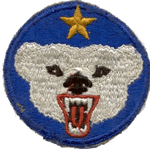World War II in the Aleutians - Shemya (APO 729)
January 26, 1943 to January 27, 1946
1. Recap of Army Facilities
Ft. Benjamine Harrison, Indiana
Ft. McClellan - Anniston, Alabama
Ft. Lawton - Seattle, Washington
4. Shemya
7. My Outfit
8. My Buddies
12. Potpourri
14. Coincidences
returning servicemen from the South Pacific as well as the Alaskan
Command. Many from the South Pacific, who were battling malaria,
had a yellow complexion cast caused by medication. Most from the
Alaskan Command were rather pale caused by lack of sun for 2 - 3 yrs.
We were told that we would be there between 4 to 7 days until troop
trains would be available to army camps close to your home. Those
camps would be where your discharge would take place.
Upon arrival, hundreds of us lined up ready to receive an orientation
regarding camp procedure, protocol, and what to expect. As the
officer started his speech, a hilarious event took place. One soldier
returned with a male dog who was born and raised on a treeless
large pine trees. You know the rest - - - - He went bananas - - - - -
dashing to and fro - - - not wanting to miss a tree - - - and continuing
on even though there was nothing left to give. The officer couldn't
compete, with 200 men laughing hysterically. I think he gave up.
At dinner time, we entered the mess hall for a special steak dinner,
with all the trimmings, fresh fruit, fresh milk - all of which on the
Islands was a faint memory. Our systems were not able to make
the adjustment and a good part of our evening was spent in the latrines.
Something however was different in this army mess hall. As we walked
along with our trays, the people dishing out the food wore different
uniforms. It turned out that the German Wehrmacht prisoners of war
from the African campaign some years before were shipped to the other
side of the world to minimize escape attempts. Later we saw other
P.O.W.'s doing landscaping, carpentry, and K.P. duty.
These all volunteered - - - the war was over - - - they were glad not to
be P.O.W.'s of the Soviets. For their labors, they were paid a small
token amount, and eventually sent back to their fatherland in one piece.
Some prisoners did not volunteer! A mutual decision was made since
no one, including prisoners, was allowed to just lay around their
barracks all day.
Imagine this - - - on the parade grounds - - - in an American Army Camp,
German P.O.W.'s, with their officers shouting commands in German,
doing short order drill and marching most of the day
One has to wonder, since the war was over, whether they would not
accept that fact- - - or did they think that Hitler would rise up from the
grave to restore them to their former glory?
We did not take all this too seriously since the whole scene was ridiculous.
More minor recollections as we returned to civilization (we were allowed
to go into town a few nights during our brief stay).
Our feet didn't sink into the cement & asphalt of
Island's tundra.
The unusual high pitch of women's voices took some getting used to.
Voices of little children, crying babies, all of the lights shining brightly.
Paying for meals in restaurants - the high cost of cigarettes, the P.X.,
(Post Exchange) sold them for 50 cents a carton. I estimate that at
least 75% 0f men smoked at that time.
Men in civilian suits & coats. AND
Using decorum because of obscene language one acquires in the service.
friendly, generous, the transportation around town free, and one welcomed
gesture; residents often went to the U.S.O. or the W.M.C.A. to invite
servicemen for dinner or the weekend.
overrun by servicemen, partly because many of us were "damn yankees",
treated us poorly, overcharged for services, and provided little reason for
the men to leave camp for the evening.
